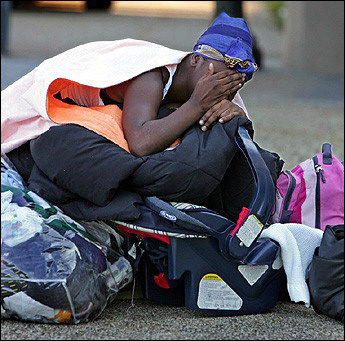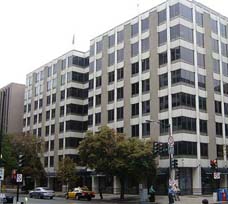2006.06.29: June 29, 2006: Headlines: COS - Thailand: Crisis Corps: Tsunami Relief: Peace Corps: Mark Henley served in Thailand as a Peace Corps volunteer (1989-91) and again as a Crisis Corps volunteer in 2005, working on tsunami reconstruction efforts
Peace Corps Online:
Directory:
Thailand:
Peace Corps Thailand:
The Peace Corps in Thailand:
2006.06.29: June 29, 2006: Headlines: COS - Thailand: Crisis Corps: Tsunami Relief: Peace Corps: Mark Henley served in Thailand as a Peace Corps volunteer (1989-91) and again as a Crisis Corps volunteer in 2005, working on tsunami reconstruction efforts
Mark Henley served in Thailand as a Peace Corps volunteer (1989-91) and again as a Crisis Corps volunteer in 2005, working on tsunami reconstruction efforts

"Although my initial assignment in Thailand as a Peace Corps volunteer sixteen years ago was very enriching, the Crisis Corps experience in some ways was even more urgent and rewarding. The Crisis Corps provided an opportunity for me to give back to my former country with more maturity, skills, wisdom, perception and professionalism."
Mark Henley served in Thailand as a Peace Corps volunteer (1989-91) and again as a Crisis Corps volunteer in 2005, working on tsunami reconstruction efforts
Mark Henley, Tsunami Reconstruction: Thailand, 2005
Mark Henley, 40, of Seattle, served in Thailand as a Peace Corps volunteer (1989-91) and again as a Crisis Corps volunteer in 2005, working on tsunami reconstruction efforts with a host country government organization on a water and sanitation engineering project.
“My Crisis Corps assignment in a tsunami devastated region of southern Thailand involved supervising the construction of a donated potable drinking water treatment plant with a market value of $400,000 USD. My responsibilities included working closely with the local sub-district government staff regarding scheduling, design interpretation (reading the construction drawings including electrical diagrams), construction management, and operations and maintenance training.
“In addition, I helped with construction tasks. I wanted to return to my Peace Corps volunteer country, in a time of need, to give back to the Thai people who were so kind to me during my initial assignment. For this assignment, it required many of the skills and abilities that I gained from jobs that I have held since being a Peace Corps volunteer in Thailand 16 years ago. I am not sure that I could have accomplished my Crisis Corps assignment with the original skill set that I came to Thailand with when I was straight out of college. Before volunteering for the Crisis Corps, I did not expect or realize that the Crisis Corps assignment would demonstrate to me how much I had learned and grown professionally after my original assignment. This was very rewarding to see the proof of what I have learned over the years.
“Although my initial assignment in Thailand as a Peace Corps volunteer sixteen years ago was very enriching, the Crisis Corps experience in some ways was even more urgent and rewarding. The Crisis Corps provided an opportunity for me to give back to my former country with more maturity, skills, wisdom, perception and professionalism.”
Crisis Corps Celebrates Decade of High-Impact Relief Work

Caption: Crisis Corps Volunteers worked in Thailand after the Tsunami in December 2004.
“A decade ago, Crisis Corps was a budding notion and today it is an essential cornerstone of Peace Corps’ contribution to the world, one that demonstrates our ability to adapt to change and respond nimbly to various challenges around the globe, and even here on American soil,” said Gaddi H. Vasquez, director of the Peace Corps.
On December 4, 1995, Peace Corps Director Mark Gearan sent Peace Corps volunteers to the island of Antigua to help rebuild homes damaged or destroyed by Hurricane Luis. This pilot effort marked what came to be known as the “Crisis Corps,” a new program within the agency that enables experienced Peace Corps volunteers to respond to humanitarian crises and natural disasters. Using the language, technical and cross-cultural skills gained through Peace Corps service and other professional experience, the Crisis Corps allows former or returned volunteers desiring to continue their service to return to the field in short-term, high-impact assignments that typically range from three to six months.
On June 19, 1996, President Clinton honored the Peace Corps at a Rose Garden ceremony reuniting the first group of volunteers who left for Ghana 35 years earlier, and a new group just about to leave for Ghana. During the ceremony, President Clinton formally announced the creation of the Crisis Corps program. Later that year, the first official Crisis Corps volunteers were sent to the Czech Republic to work on environ-mental issues following severe floods.
Where Crisis Corps Has Served

Caption: The Crisis Corps Office emailed over 2400 Returned Peace Corps Volunteers to gauge their interest in volunteering for recovery efforts after Hurricane Katrina. Over 400 responses were received from that initial email. The first group of Crisis Corps Volunteers traveled to the FEMA staging area in Orlando, Florida to receive training and their assignments.
Crisis Corps volunteers have served throughout the world in a variety of capacities.
In Africa, Crisis Corps volunteers have worked in the fields of humanitarian assistance, HIV/AIDS, natural disaster relief and reconstruction, disaster preparedness and mitigation, post-conflict relief and reconstruction. They have volunteered in Cameroon, Côte d'Ivoire, Democratic Republic of Congo, Ghana, Guinea, Kenya, Lesotho, Madagascar, Malawi, Mauritania, Mozambique, Namibia, South Africa, Tanzania Togo and Zambia.
In Asia, volunteers have been involved in humanitarian assistance, natural disaster relief and reconstruction in Thailand and Sri Lanka following the 2004 tsunami. In the Caribbean, Crisis Corps volunteers have worked in humanitarian assistance, HIV/AIDS, natural disaster relief and reconstruction, disaster preparedness and mitigation, post-conflict relief and reconstruction in Antigua, Dominican Republic, Haiti, Jamaica and Montserrat.
Latin America has also benefited enormously from the work of Crisis Corps volunteers. Working in the areas of humanitarian assistance, HIV/AIDS, natural disaster relief and reconstruction, disaster preparedness and mitigation, post-conflict relief and reconstruction, volunteers have served in Belize, Bolivia, Chile, Ecuador, El Salvador, Guatemala, Honduras, Nicaragua, Paraguay, Suriname and Venezuela.
In the Pacific Islands, volunteers have worked in humanitarian assistance, HIV/AIDS, natural disaster relief and reconstruction, disaster preparedness and mitigation, post-conflict relief and reconstruction in the Cook Islands, Federated States of Micronesia, Palau and Papua New Guinea.
Since Crisis Corps' inception in 1996, 1000 returned Peace Corps volunteers have taken the opportunity to use their invaluable skills and experience to address ongoing community needs in 42 different countries. Crisis Corps volunteers work on short term projects, utilizing the skills they learned as Peace Corps volunteers and in post service careers. To learn more about the Peace Corps’ Crisis Corps program, visit the Peace Corps Web site.
When this story was posted in August 2006, this was on the front page of PCOL:





Peace Corps Online The Independent News Forum serving Returned Peace Corps Volunteers
 | The Peace Corps is "fashionable" again
The LA Times says that "the Peace Corps is booming again and "It's hard to know exactly what's behind the resurgence." PCOL Comment: Since the founding of the Peace Corps 45 years ago, Americans have answered Kennedy's call: "Ask not what your country can do for you--ask what you can do for your country. My fellow citizens of the world: ask not what America will do for you, but what together we can do for the freedom of man." Over 182,000 have served. Another 200,000 have applied and been unable to serve because of lack of Congressional funding. The Peace Corps has never gone out of fashion. It's Congress that hasn't been keeping pace. |
 | Changing the Face of Hunger
In his new book, Former Congressman Tony Hall (RPCV Thailand) says humanitarian aid is the most potent weapon the United States can deploy against terrorism. An evangelical Christian, he is a big believer in faith-based organizations in the fight against hunger. Members of Congress have recently recommended that Hall be appointed special envoy to Sudan to focus on ending the genocide in Darfur. |
 | PC will not return to East Timor in 2006
Volunteers serving in East Timor have safely left the country as a result of the recent civil unrest and government instability. Latest: The Peace Corps has informed us that at this time, the Peace Corps has no plans to re-enter the country in 2006. The Peace Corps recently sent a letter offering eligible volunteers the opportunity to reinstate their service in another country. |
 | Chris Dodd considers run for the White House
Senator Chris Dodd plans to spend the next six to eight months raising money and reaching out to Democrats around the country to gauge his viability as a candidate. Just how far Dodd can go depends largely on his ability to reach Democrats looking for an alternative to Hillary Clinton. PCOL Comment: Dodd served as a Volunteer in the Dominican Republic and has been one of the strongest supporters of the Peace Corps in Congress. |
 | Vasquez testifies before Senate Committee
Director Vasquez testifies before the Senate Foreign Relations Committee on his nomination as the new Representative to the United Nations Agencies for Food and Agriculture replacing Tony Hall. He has been the third longest serving Peace Corps Director after Loret Ruppe Miller and Sargent Shriver. PCOL Comment: Read our thanks to Director Vasquez for his service to the Peace Corps. |
 | Interview with a Hit Man
RPCV John Perkins says that for many years he was an "economic hit man" in the world of international finance whose primary job was to convince less developed countries to accept multibillion dollar loans for infrastructure projects that left the recipient countries wallowing in debt and highly vulnerable to outside political and commercial interests. In this exclusive interview for "Peace Corps Online," Colombia RPCV Joanne Roll, author of Remember with Honor, talks to Perkins about his Peace Corps service, his relation with the NSA, "colonization" in Ecuador, the consequences of his work, why he decided to speak out, and what his hopes are for change. |
 | Peace Corps stonewalls on FOIA request
The Ashland Daily Tidings reports that Peace Corps has blocked their request for information on the Volkart case. "After the Tidings requested information pertaining to why Volkart was denied the position — on March 2 — the newspaper received a letter from the Peace Corps FOIA officer stating the requested information was protected under an exemption of the act." The Dayton Daily News had similar problems with FOIA requests for their award winning series on Volunteer Safety and Security. |
 | PCOL readership increases 100%
Monthly readership on "Peace Corps Online" has increased in the past twelve months to 350,000 visitors - over eleven thousand every day - a 100% increase since this time last year. Thanks again, RPCVs and Friends of the Peace Corps, for making PCOL your source of information for the Peace Corps community. And thanks for supporting the Peace Corps Library and History of the Peace Corps. Stay tuned, the best is yet to come. |
 | History of the Peace Corps
PCOL is proud to announce that Phase One of the "History of the Peace Corps" is now available online. This installment includes over 5,000 pages of primary source documents from the archives of the Peace Corps including every issue of "Peace Corps News," "Peace Corps Times," "Peace Corps Volunteer," "Action Update," and every annual report of the Peace Corps to Congress since 1961. "Ask Not" is an ongoing project. Read how you can help. |
 | RPCV admits to abuse while in Peace Corps
Timothy Ronald Obert has pleaded guilty to sexually abusing a minor in Costa Rica while serving there as a Peace Corps volunteer. "The Peace Corps has a zero tolerance policy for misconduct that violates the law or standards of conduct established by the Peace Corps," said Peace Corps Director Gaddi H. Vasquez. Could inadequate screening have been partly to blame? Mr. Obert's resume, which he had submitted to the Peace Corps in support of his application to become a Peace Corps Volunteer, showed that he had repeatedly sought and obtained positions working with underprivileged children. Read what RPCVs have to say about this case. |
 | Why blurring the lines puts PCVs in danger
When the National Call to Service legislation was amended to include Peace Corps in December of 2002, this country had not yet invaded Iraq and was not in prolonged military engagement in the Middle East, as it is now. Read the story of how one volunteer spent three years in captivity from 1976 to 1980 as the hostage of a insurrection group in Colombia in Joanne Marie Roll's op-ed on why this legislation may put soldier/PCVs in the same kind of danger. Latest: Read the ongoing dialog on the subject. |
Read the stories and leave your comments.

Some postings on Peace Corps Online are provided to the individual members of this group without permission of the copyright owner for the non-profit purposes of criticism, comment, education, scholarship, and research under the "Fair Use" provisions of U.S. Government copyright laws and they may not be distributed further without permission of the copyright owner. Peace Corps Online does not vouch for the accuracy of the content of the postings, which is the sole responsibility of the copyright holder.
Story Source: Peace Corps
This story has been posted in the following forums: : Headlines; COS - Thailand; Crisis Corps; Tsunami Relief
PCOL33392
11




























